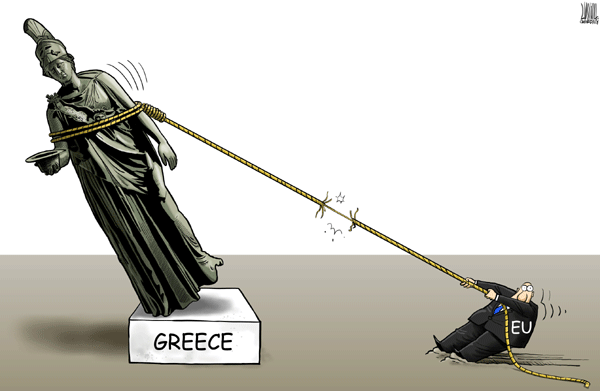By Rajan Menon, Huffington Post
Sometimes, you’re strongest when you’re weakest. This is the paradox presently prevailing within the Eurozone.
Until recently, the idea of issuing Eurobonds was dismissed as politically infeasible because it would in effect commit the EU’s financially most prudent members to guaranteeing the loans of its most profligate ones. That Eurobonds would lower Greece’s borrowing costs and thus prevent its exit from the Eurozone and subsequent default seemed of little significance. The stock response was that the Germans wouldn’t allow their taxes to shore up another country, even a co-member of the EU, which had landed in a colossal mess on account of its own economic mismanagement. An addendum was that Germany’s opposition to collectivizing debt would be backed by the other well-managed economies of northern Europe and therefore be all the more unshakable.
Other ideas to help the Eurozone’s down-and-out members were deemed infeasible on similar grounds. These included allowing the European Central Bank to pursue a more lax monetary policy (because that wouldn’t sit well with inflation-obsessed Berlin), increasing the European Investment Bank’s funds and allocating monies from the EU’s Structural Funds to finance job-generating projects in countries with the highest unemployment rates, and beefing up the planned European Stability Mechanism (not to be confused with the already-existing European Financial Stability Facility).
Now, less than a month after the Greek and French elections, several of these ideas are being discussed within the EU, including Eurobonds — arguably the most controversial.
To be sure, the opponents have not been converted. And the talk is tentative: No official plan has been proffered to explain how Eurobonds would work and how the beneficiaries would be held to the budget cuts they promise to make as a quid pro quo, especially since there’s scant enthusiasm for what would amount to additional political integration (which is what relinquishing fiscal autonomy would require) in the EU.
These issues doubtlessly need to be addressed, but what’s notable is the sea change in the conversation. Ideas that were once off the table are now being taken up by EU governments and organizations and Euro pundits. The austerity discourse no longer dominates.
Why?
The standard answer goes like this: Francois Hollande’s election changed everything. France and Germany are the EU’s political titans. With Sarkozy gone and Hollande openly pushing for Eurobonds — and, more generally, rejecting the notion that the EU’s most-debt burdened countries can only become healthy again by going on a crash diet — it’s harder for German Chancellor Angela Merkel to insist on persevering with the no-pain-no-gain program. That’s especially true because draconian spending cuts have created massive economic hardship for ordinary Greeks and Spaniards without producing the economic growth and thus the revenue their governments need to emerge from the avalanche of debt.
There’s some truth to this take. Yet the real reason for the shift in the economic dialog is not France’s strength; it’s Greece’s weakness.
Why exactly have Greece’s deepening economic distress and the political chaos revealed by its recent elections actually increased its leverage? Because no matter how unpopular the idea of Eurobonds in Germany and like-minded northern European countries, there’s no avoiding a basic fact: The degree of economic, particularly financial, interdependence that has occurred in the EU since the introduction of the Euro in 1999 has made Greece’s problems every EU country’s problems, especially if it’s in the eurozone. It follows that as Greece’s problems mount, so do everyone else’s.
The drastic step of expelling Greece from the eurozone, or engineering its exit, would perhaps have more support were the adverse consequences calculable and controllable. But no eurozone official or expert thinks they are. The emerging consensus is that problems produced by Athens’s eviction or departure won’t be predictable, containable, or short-lived.
Meanwhile, the Greeks’ anti-austerity case has gained traction in the EU, even as their economic circumstances have gotten worse and they need more help. That’s not as strange as it seems.
There’s an adage that goes something like this: If someone owes you $1,000, you have him by the throat; if he owes you $1 million, he has you by the throat. This sums up the relationship between Greece and the rest of the eurozone. Greece’s total debt, public and private, to eurozone organizations, governments, and banks, is about 356 billion euros, or almost $450 billion. That’s just an estimate. The history of international financial crises since 2008 suggests that the true total could be considerably larger. So if Greece departs and then defaults, a very likely consequence, a lot of European banks and countries could lose a lot of money and ordinary Europeans would feel the consequences. But the EU would have to spend a lot of extra money to prevent, or reduce the severity of, this outcome.
The problems won’t stop there. Money is already leaving Greek banks (16 billion Euros since 2009 and 3 billion in withdrawals since the May 6 election alone). As concerns mount about the health of some Spanish banks, capital flight from them and those in other weak Eurozone countries (Portugal, Ireland, and Italy), already substantial, will increase. Whatever the facts, and no matter official reassurances, when fear and uncertainty abound, reason loses its force — panic prevails.
Moreover, the interest rates that Spain, as well as Portugal and Italy, will have to pay for their bonds (their ten-year rates are already in the 12.24 to 6 percent range, compared to a 3.59 percent average for the eurozone now) will increase quickly if Greece leaves the eurozone. That’s because their creditworthiness will become an even bigger issue, particularly should Spain start to resemble Greece. The ripple effects on governments and banks in other eurozone countries with outstanding loans will then be inestimable. And since markets abhor uncertainty, there are bound to be all manner of additional consequences, none good.
So how has Greece become more influential than it has ever been since the European economic crisis commenced? Because it has never been politically and economically weaker and is becoming more so. That’s the paradox. Dealing with it will require not just new proposals but new policies. And soon.



















